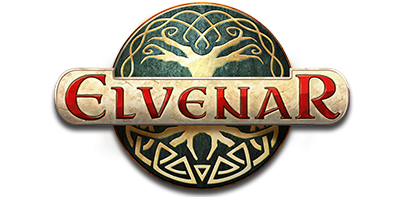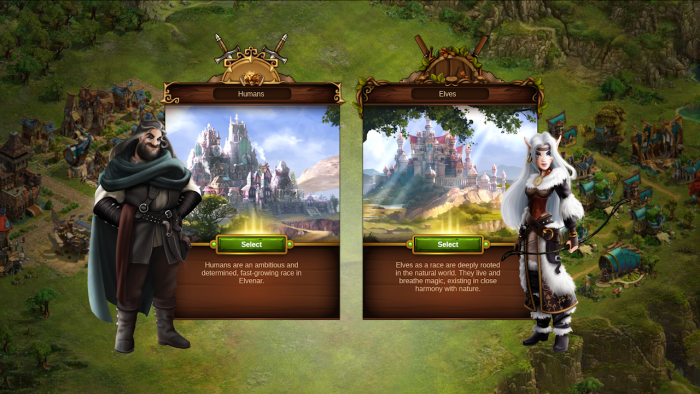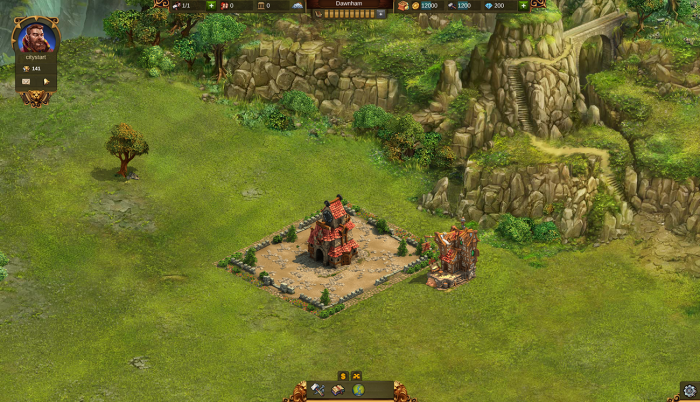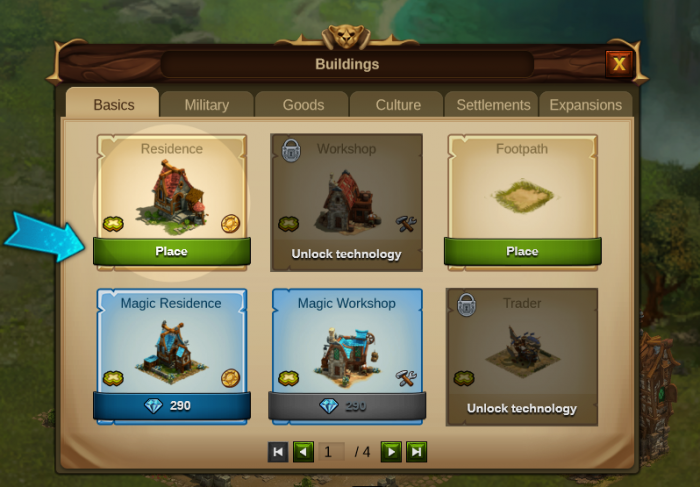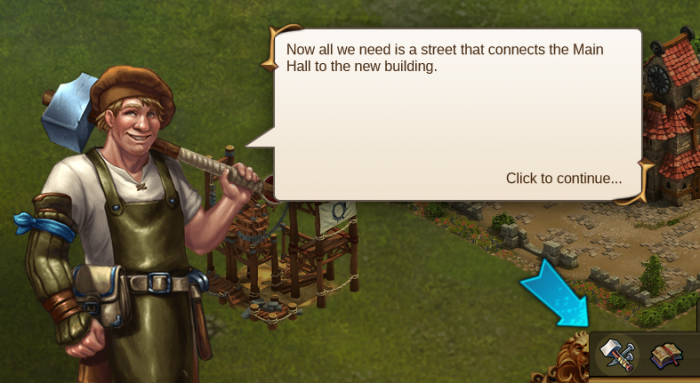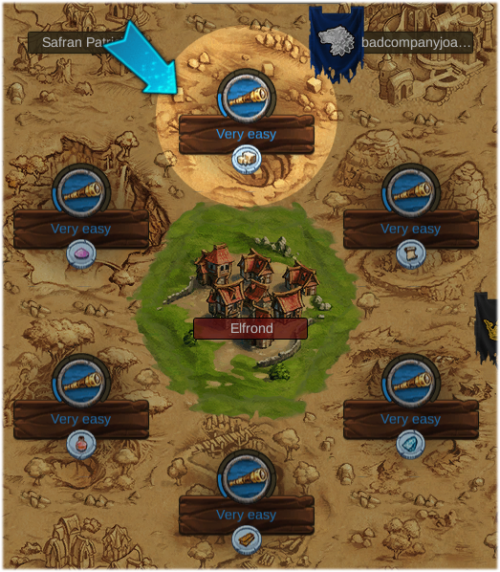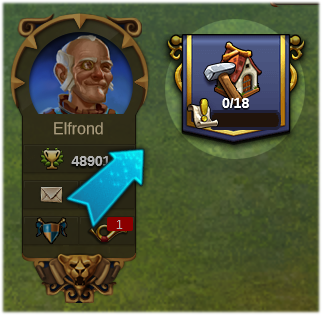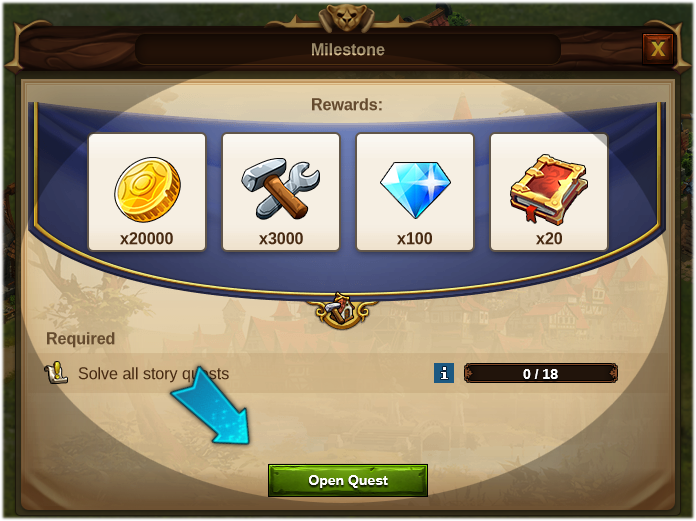Basis: verschil tussen versies
Geen bewerkingssamenvatting |
|||
| (108 tussenliggende versies door 10 gebruikers niet weergegeven) | |||
| Regel 1: | Regel 1: | ||
[[Category:Help]] | |||
=== Volkeren === | |||
Direct nadat je je account hebt aangemaakt en inlogt op jouw spelwereld (spelserver), krijg je de keuze of je als Elf of Mens wilt spelen. | |||
[[File:Race Selection_New.png|700px|center]] | |||
Het spelverloop van beide volkeren is gelijkwaardig, maar je keuze zal van invloed zijn op een paar belangrijke zaken: | |||
* Het uiterlijk van je stad zal afhangen van het volk dat je hebt gekozen. Elven zijn magische wezens en zij leven in harmonie met de natuur. Het ontwerp van hun gebouwen is ver ontwikkeld. Mensen zijn heel ambitieus en vastberaden, wat betekent dat ze een meer middeleeuwse en geïndustrialiseerde stijl hebben. | |||
* De militaire [[Eenheden|eenheden]] die je tot je beschikking hebt, zullen ook verschillen. Elven zullen bijvoorbeeld onder meer afhankelijk zijn van Treants en Mensen op Bijlkrijgers. | |||
Wanneer we een nieuwe spelwereld (spelserver) krijgen op Elvenar NL, zul je ook de mogelijkheid hebben om als het andere volk te spelen. | |||
=== Stadsplattegrond === | |||
In het begin, start je met een beperkt gebied om je stad te bouwen. De stadsplattegrond is een gebied verdeeld in tegels die eruitziet als een vierkant raster en waar je je eerste gebouwen kunt plaatsen om de ontwikkeling van je stad te starten. Je begint met 15x10 tegels. | |||
[[File:city_start_human.png|700px|center]] | |||
Natuurlijk is je doel om uit te breiden en je grootste uitdaging is om het beste uit de beschikbare ruimte te halen. Om je bebouwbare oppervlakte te vergroten, kunt je uitbreidingen in de onderzoeksboom vrijspelen, ze verkrijgen door alle ontmoetingen in een provincie op de wereldkaart op te lossen of een premium uitbreiding kopen met diamanten. Elke uitbreiding heeft een oppervlakte van 25 tegels (5x5). | |||
In het begin zul je al twee gebouwen in je stad vinden: Het Stadhuis en de Arbeidershut. | |||
[[ | *Het '''[[Stadhuis|Stadhuis]]''' is het middelpunt van je stad en fungeert als je opslagruimte. De meeste gebouwen moeten via een weg zijn aangesloten aan je Stadhuis om functioneel te zijn. | ||
In | *In de '''[[Arbeidershut|Arbeidershut]]''' zul je je Arbeiders vinden. Zij helpen je gebouwen te bouwen en upgraden en dragen zorg voor je huidige constructies. | ||
=== Basis Grondstoffen === | |||
Er zijn twee basis grondstoffen in Elvenar, die je helpen je stad op te bouwen: | |||
[[File:Hudrot.png|center|Bovenste balk, laat de beschikbare grondstoffen zien]] | |||
*Munten: Munten worden automatisch geproduceerd in je [[Huis|'''woningen''']]. | |||
*Voorraden: Om Voorraden te produceren, moet je daarvoor opdracht geven in een [[Werkplaats|Werkplaats]]. Elk type productie vereist een andere tijdsduur. | |||
{|align="center" cellpadding="1" width="100%" | |||
|style="background-color:#af895f;|'''Hint:''' Zodra je gebouwen klaar zijn met hun productie, kan je hun productie tegelijkertijd verzamelen! Je hoeft enkel maar op één productiegebouw te klikken en je muis over al de anderen te slepen. | |||
= | |||
Hint: | |||
|} | |||
= | === Eerste Stappen === | ||
[[File:mentor_elves.png|right|link=]] | |||
Aan het begint van het spel, moet je op drie dingen letten: | |||
Ten eerste: '''Je kunt geen stad hebben zonder inwoners.''' | |||
Wanneer je je stad begint op te bouwen, zul je eerst een aantal huizen moeten plaatsen. Huizen zorgen ervoor dat je beschikbare bevolking hebt en munten genereert. De meeste gebouwen die je wilt bouwen, vereisen inwoners die in die gebouwen kunnen werken, de bouwkosten bestaan voornamelijk uit munten die uw woningen zullen genereren. Aangeraden wordt om in het begin minstens acht huizen te bouwen. Ze zijn goedkoop en snel gebouwd. Vergeet niet om ze met je stadhuis te verbinden door middel van wegen. | |||
Ten tweede: '''Je zult Voorraden moeten produceren zodra je je huizen hebt gebouwd.''' | |||
Ze zijn een zeer waardevolle hulpbron die gebruikt wordt om bepaalde gebouwen te bouwen, en later ook om goederen te produceren en om je gevechtseenheden te trainen. Voorraden kunnen worden geproduceerd in de Werkplaats, dus we raden je aan om minstens 3 Werkplaatsen te bouwen zodra je een aantal Huizen hebt. Met genoeg Munten en Voorraden, heb je je economie al draaiend weten te krijgen. | |||
[[ | En ten derde heb je [[Culturele Gebouwen|'''''culturele gebouwen''''']] nodig in je stad. Hiermee kunt je andere gebouwen upgraden en je populatie met maximale efficiëntie produceren. Je stadsruimte is beperkt en zal dat altijd blijven. Het upgraden van gebouwen om hun eigenschappen te verbeteren, is dus van cruciaal belang om de beschikbare ruimte optimaal te benutten. Om te upgraden, heb je veel munten en voorraden nodig, evenals inwoners en [[Culturele Gebouwen|'''''cultuur''''']]. Zorg er daarom altijd voor dat je voldoende cultuuroverschot hebt om je stad vooruit te helpen. | ||
Als je meer beschikbare [[Culturele Gebouwen|'''''cultuur''''']] hebt dan nodig is voor je upgrades, zullen je bewoners gelukkiger zijn en efficiënter produceren. Tot op zekere hoogte, is dit de goedkoopste manier om meer Munten en Voorraden te verdienen. Ga er echter niet te ver in! Het heeft geen nut om een stad vol te bouwen met [[Culturele Gebouwen|'''''culturele gebouwen''''']] terwijl je geen [[Huis|'''''huizen''''']] hebt om in te wonen. | |||
Om dit allemaal gemakkelijk te maken, volgt je gewoon de gids die je deze eerste fasen laat zien en hoe je kunt beginnen met het creëren van je stad: | |||
[[File:Begin1.png|center|700px]]<br> | |||
[[File:Guide1.png|center|700px]] | |||
Als je stad eenmaal groeit, is het een goed moment om naar de [[Wereldkaart|'''Wereldkaart''']] te gaan, waar je je buren kunt zien, provincies kunt "verkennen", "ontmoetingen" kunt ervaren en voorwerpen kunt verzamelen zoals relikwieën en kennispunten. | |||
[[File:Worldmap1.png|center|500px]] | |||
====Eerste opdrachten==== | |||
Om je ervaring met het spel te vergroten en je te helpen je stad op te bouwen, wordt je gevraagd om een aantal eenvoudige opdrachten te voltooien: | |||
[[File:Firstquests1.png|center]] | |||
[[File:Firstquestwindow1.png|center|700px]] | |||
Voltooi al deze opdrachten om super starters-beloningen te krijgen! | |||
{| | {|align="center" cellpadding="1" width="100%" | ||
|style="background-color:#af895f;|Nog een laatste advies voor beginners: '''Luister naar je adviseurs!''' Als je regelmatig de terugkerende opdrachten voltooit, zul je rijkelijk beloond worden en wordt het makkelijker voor je om vooruitgang te boeken in het spel. | |||
|} | |} | ||
Huidige versie van 5 jul 2020 om 16:26
Volkeren
Direct nadat je je account hebt aangemaakt en inlogt op jouw spelwereld (spelserver), krijg je de keuze of je als Elf of Mens wilt spelen.
Het spelverloop van beide volkeren is gelijkwaardig, maar je keuze zal van invloed zijn op een paar belangrijke zaken:
- Het uiterlijk van je stad zal afhangen van het volk dat je hebt gekozen. Elven zijn magische wezens en zij leven in harmonie met de natuur. Het ontwerp van hun gebouwen is ver ontwikkeld. Mensen zijn heel ambitieus en vastberaden, wat betekent dat ze een meer middeleeuwse en geïndustrialiseerde stijl hebben.
- De militaire eenheden die je tot je beschikking hebt, zullen ook verschillen. Elven zullen bijvoorbeeld onder meer afhankelijk zijn van Treants en Mensen op Bijlkrijgers.
Wanneer we een nieuwe spelwereld (spelserver) krijgen op Elvenar NL, zul je ook de mogelijkheid hebben om als het andere volk te spelen.
Stadsplattegrond
In het begin, start je met een beperkt gebied om je stad te bouwen. De stadsplattegrond is een gebied verdeeld in tegels die eruitziet als een vierkant raster en waar je je eerste gebouwen kunt plaatsen om de ontwikkeling van je stad te starten. Je begint met 15x10 tegels.
Natuurlijk is je doel om uit te breiden en je grootste uitdaging is om het beste uit de beschikbare ruimte te halen. Om je bebouwbare oppervlakte te vergroten, kunt je uitbreidingen in de onderzoeksboom vrijspelen, ze verkrijgen door alle ontmoetingen in een provincie op de wereldkaart op te lossen of een premium uitbreiding kopen met diamanten. Elke uitbreiding heeft een oppervlakte van 25 tegels (5x5).
In het begin zul je al twee gebouwen in je stad vinden: Het Stadhuis en de Arbeidershut.
- Het Stadhuis is het middelpunt van je stad en fungeert als je opslagruimte. De meeste gebouwen moeten via een weg zijn aangesloten aan je Stadhuis om functioneel te zijn.
- In de Arbeidershut zul je je Arbeiders vinden. Zij helpen je gebouwen te bouwen en upgraden en dragen zorg voor je huidige constructies.
Basis Grondstoffen
Er zijn twee basis grondstoffen in Elvenar, die je helpen je stad op te bouwen:
- Munten: Munten worden automatisch geproduceerd in je woningen.
- Voorraden: Om Voorraden te produceren, moet je daarvoor opdracht geven in een Werkplaats. Elk type productie vereist een andere tijdsduur.
| Hint: Zodra je gebouwen klaar zijn met hun productie, kan je hun productie tegelijkertijd verzamelen! Je hoeft enkel maar op één productiegebouw te klikken en je muis over al de anderen te slepen. |
Eerste Stappen
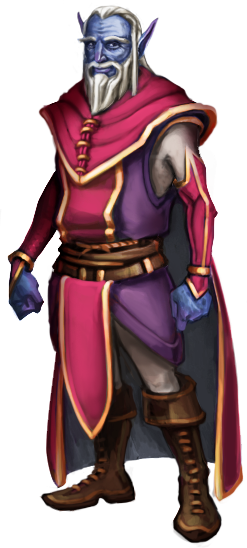
Aan het begint van het spel, moet je op drie dingen letten:
Ten eerste: Je kunt geen stad hebben zonder inwoners.
Wanneer je je stad begint op te bouwen, zul je eerst een aantal huizen moeten plaatsen. Huizen zorgen ervoor dat je beschikbare bevolking hebt en munten genereert. De meeste gebouwen die je wilt bouwen, vereisen inwoners die in die gebouwen kunnen werken, de bouwkosten bestaan voornamelijk uit munten die uw woningen zullen genereren. Aangeraden wordt om in het begin minstens acht huizen te bouwen. Ze zijn goedkoop en snel gebouwd. Vergeet niet om ze met je stadhuis te verbinden door middel van wegen.
Ten tweede: Je zult Voorraden moeten produceren zodra je je huizen hebt gebouwd. Ze zijn een zeer waardevolle hulpbron die gebruikt wordt om bepaalde gebouwen te bouwen, en later ook om goederen te produceren en om je gevechtseenheden te trainen. Voorraden kunnen worden geproduceerd in de Werkplaats, dus we raden je aan om minstens 3 Werkplaatsen te bouwen zodra je een aantal Huizen hebt. Met genoeg Munten en Voorraden, heb je je economie al draaiend weten te krijgen.
En ten derde heb je culturele gebouwen nodig in je stad. Hiermee kunt je andere gebouwen upgraden en je populatie met maximale efficiëntie produceren. Je stadsruimte is beperkt en zal dat altijd blijven. Het upgraden van gebouwen om hun eigenschappen te verbeteren, is dus van cruciaal belang om de beschikbare ruimte optimaal te benutten. Om te upgraden, heb je veel munten en voorraden nodig, evenals inwoners en cultuur. Zorg er daarom altijd voor dat je voldoende cultuuroverschot hebt om je stad vooruit te helpen.
Als je meer beschikbare cultuur hebt dan nodig is voor je upgrades, zullen je bewoners gelukkiger zijn en efficiënter produceren. Tot op zekere hoogte, is dit de goedkoopste manier om meer Munten en Voorraden te verdienen. Ga er echter niet te ver in! Het heeft geen nut om een stad vol te bouwen met culturele gebouwen terwijl je geen huizen hebt om in te wonen.
Om dit allemaal gemakkelijk te maken, volgt je gewoon de gids die je deze eerste fasen laat zien en hoe je kunt beginnen met het creëren van je stad:
Als je stad eenmaal groeit, is het een goed moment om naar de Wereldkaart te gaan, waar je je buren kunt zien, provincies kunt "verkennen", "ontmoetingen" kunt ervaren en voorwerpen kunt verzamelen zoals relikwieën en kennispunten.
Eerste opdrachten
Om je ervaring met het spel te vergroten en je te helpen je stad op te bouwen, wordt je gevraagd om een aantal eenvoudige opdrachten te voltooien:
Voltooi al deze opdrachten om super starters-beloningen te krijgen!
| Nog een laatste advies voor beginners: Luister naar je adviseurs! Als je regelmatig de terugkerende opdrachten voltooit, zul je rijkelijk beloond worden en wordt het makkelijker voor je om vooruitgang te boeken in het spel. |
